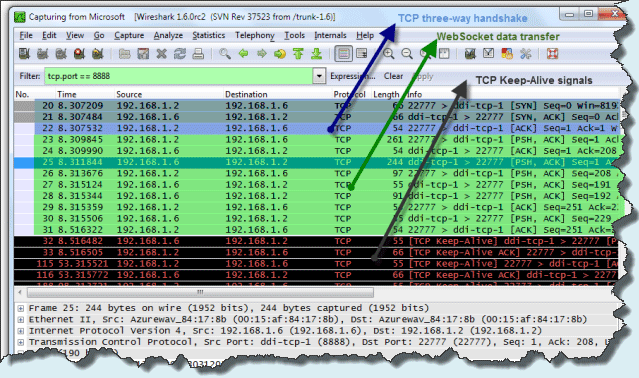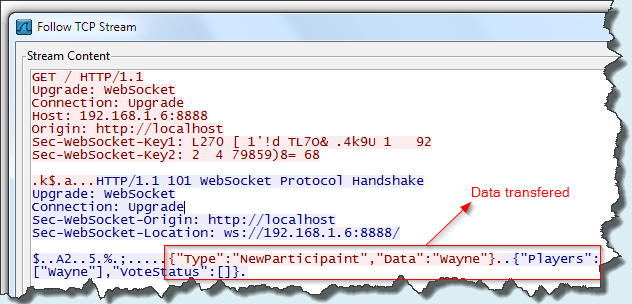WebSockets
Intro
WebSockets?
-
full-duplex
-
TCP-based
-
persistent connection
-
message-oriented
-
cross-origin
-
standardized protocol
-
JavaScript API
WebSockets in action
-
http://wordsquared.com/
- http://paintwith.me/
- ...
…and more!
Why WebSockets?
-
HTTP is half-duplex
-
HTTP has too much overhead
-
Ajax doesn’t help
- Comet doesn’t help


WebSocket protocol
-
protocol hell
-
security issues in hixie-76
-
RFC 6455
WebSocket protocol
HTTP/1.1 101 Switching Protocols
Upgrade: websocket
Connection: Upgrade
Sec-WebSocket-Accept: s3pPLMBiTxaQ9kYGzzhZRbK+xOo=
Sec-WebSocket-Protocol: chat
WebSocket protocol
GET /chat HTTP/1.1
Host: server.example.com
Upgrade: websocket
Connection: Upgrade
Sec-WebSocket-Key: dGhlIHNhbXBsZSBub25jZQ==
Origin: http://example.com
Sec-WebSocket-Protocol: chat, superchat
Sec-WebSocket-Version: 13packets behind WebSocket connection

WebSocket request & response headers

Using WebSockets
-
Server-side:
- Node.js
- WebSocket-Node
- Socket.IO
- C#/.NET (IIS 8 ASP.NET 4.5)
- XSockets.NET
- Fleck
- Java
- Atmosphere
- Ruby
- EM-WebSocket
Browser Support

WebSocket API
WebSocket WebSocket(
in DOMString url,
in optional DOMString protocols
);
WebSocket WebSocket(
in DOMString url,
in optional DOMString[] protocols
);WebSocket API
-
Parse URL or throw SYNTAX_ERR
-
If port is blocked, throw SECURITY_ERR
-
Check sub-protocol
-
Get origin from <script>
-
Return WebSocket object
-
Establish a socket connection
WebSocket API
Status
- readyState
- CONNECTING ( = 0 )
- OPEN ( = 1 ) CLOSE ( = 2 )
- CLOSING
-
onopen
-
onmessage
-
onclose
-
onerror
Methods
-
close(code, reason)
-
send(data)
- String
- ArrayBuffer
- Blob
Simple Chat
Feature: Simple chat
In order to websocket's challenge
As a presenter
I will create a simple chatSimple chat
Intro
Scenario: At the beginning every user can select their name
Given New user
When try to connect to the chat
Then user can select his name
Simple chat
New message
Scenario: New message
Given user which was already connected to the chat
And several users was already connected to the chat
When user enter a new message
Then all users will receive messageSimple chat
Message history
Scenario: Message history
Given New user
And History is not empty
When Use connect to the chat
Then User will recieve entire message historySimple Chat
Close connection
Scenario: Close connection
Given User which was already connected to the chat
When a user closes the browser window
Then server will post another system message to the console that a user has disconnected.Simple chat
API
- type
- message - one element
- author
- text
- time
- history
- array of elements
Simple chat
Need help?
input.keydown(function(e) { var msg; if (e.keyCode === 13) { msg = $(this).val(); if (!msg) return; connection.send(msg); $(this).val("");}
Simple chat
Binary data in JS [oh why]
- WebGL
- Files
- XHR2
- WebSockets
- DataView
- Type arrays
- Blobs
- Clamped array
- ...
Binary data in JS [is great]
var buffer = new ArrayBuffer(16)
var dv = new DataView(buffer, 8, 4)
Binary data in JS [is great]
dv.setUint16(2, 0x1337)
dv.getInt8(2) -> 0x13var arr = new Int32Array(buffer)

Blobs
API
Blob Blob(
[optional] Array parts,
[optional] BlobPropertyBag properties
);
Blob slice(
optional long long start,
optional long long end,
optional DOMString contentType
};
Binary data over WS
…just send it already!
|
opcode |
meaning |
|
0 |
Continuation Frame |
|
1 |
Text Frame |
|
2 |
Binary Frame |
|
8 |
Connection Close Frame |
|
9 |
Ping Frame |
|
10 |
Pong Frame |
socket.binaryType = “arraybuffer” | “blob”
The WebSocket Challenge
-
ArrayBuffer
-
JSON Danger
THE WEBSOCKET CHALLENGE
-
{ msg:”challenge_accepted”, name: “Socketeers” }
- { msg: “auth”, auth_token: “6f7sd8s78”}
- Task1 request: { msg: “task_one”, auth_token: “6f7sd8s78”}
- Task1 server response: { msg: “compute”, operator:”+/-/*”, operands:[4,5]}
- Task1 send result: { msg: “task_one_result”, result: “9”, auth_token: “6f7sd8s78” }
- Task2 request: { msg: ???, auth_token: “6f7sd8s78” }
- Task2 server response: {msg: “binary_sum”, bits: 8/16 } and ArrayBuffer (16 bytes)Convert to an unsigned typed array according to the `bits` field
- Task2 send result: { msg: “task_two_result”, result: “0”, auth_token: “6f7sd8s78” }
THE WEBSOCKET CHALLENGE
Check message type with typeof evt.data == “string”
XXX.XXX.XXX.XXX:8080
WebSockets
By Pavel Nasovich
WebSockets
Introducing to real-time web via websockets
- 1,265



